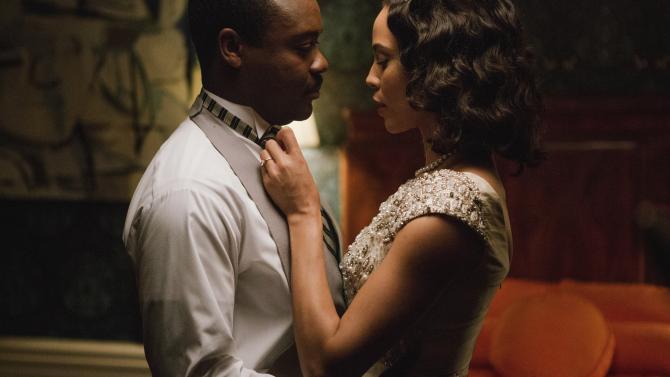By: Julie Walker

As one watches Selma—which opens in limited release Christmas Day and nationwide Jan. 9—it’s hard not to reflect on the protests going on around the country over the shooting deaths of unarmed black men by white police officers. It’s a topic that comes up often when Selma director Ava DuVernay discusses her film. She and some of her cast even posted a picture on social media in which they wore “I Can’t Breathe” T-shirts at the movie’s New York City premiere to show solidarity with #BlackLivesMatter protesters.
At 42, DuVernay is too young to have lived through the events depicted in Selma. But her film reminds those in her generation, and mine, what our parents and grandparents fought and, in some cases, died for.
She tells the story of three months in Selma, Ala., in 1965 when Martin Luther King Jr. was mobilizing his movement in the fight for voting rights. As history shows, the effort paved the way for the passage of the Voting Rights Act through Congress later that year. And while the film is not a history lesson, it offers an intimate portrait of a man and a time in history that should never be underestimated, overlooked or forgotten. In the end, the film is bigger than King—it’s about the bloody civil rights campaign in Selma and the outcome it yielded. It’s about the politics and the personal battles that shaped part of King’s life and the movement at that time.
Selma is an emotionally wrought film, told vividly through the eyes of not just King but also many of the other African-American icons who shaped the movement. The protest scenes in which police officers beat peaceful demonstrators with billy clubs push all the buttons that DuVernay hopes to—we feel the pain, injustice and moral outrage. At one point we even see Annie Lee Cooper, played by Oprah Winfrey, knocked to the ground and set upon by police with batons.
Winfrey is extremely impactful as Cooper, the proud and courageous Selma resident who tried several times to register to vote, only to be turned away. Cooper is most famously known for punching Selma Sheriff James Clark (Stan Houston). Upon first seeing Winfrey on-screen, I had to blink to make sure it was her, costumed in cat-eye glasses and a frumpy outfit. Winfrey and Brad Pitt (who does not appear in the film) are part of the producing team that helped make the picture happen after years of delays. Lee Daniels was slated to direct Selmabefore the film’s original deal fell apart, and it’s clear that if he had, we would have seen a very different film.
DuVernay told The Root in September that she wanted to portray King the man, and not the myth. She achieves this admirably by mixing his private moments of doubt with widely known public speeches that illustrate why he succeeded as a leader. Even his infidelities are shown through the eyes of his wife, played by Scottish-Nigerian actress Carmen Ejogo, who reprises her role as Coretta Scott King in HBO’s Boycott.
Ejogo’s performance is nuanced and moving as the wife who seems to want just a little more love and respect. In the film, Mrs. King is shown listening to recordings of her husband making love to other women—part of FBI chief J. Edgar Hoover’s (Dylan Baker) campaign to tear down King. We see how King’s private battles spilled over to his very public battles.
David Oyelowo’s pitch-perfect performance as MLK deserves an Oscar nomination, as does the film itself. The British actor, who was also in Lee Daniels’ The Butler and DuVernay’s Middle of Nowhere, embodies King. He transforms himself into the leader, from his shaved hairline to his deliberate speech patterns. The actor has said that the role took an emotional toll on him, and it’s clear why: When you see and hear Oyelowo speak with his native British accent and contrast that with him speaking on-screen as King, it’s breathtaking.
DuVernay uses music from the B sides of several popular records from 1965 on the soundtrack. Although several of the songs aren’t well-known, they work well for a film that wants to feel—and succeeds at feeling—fresh, even as it examines a moment in history that feels familiar.
Julie Walker is a New York-based freelance journalist. Follow her on Twitter.















